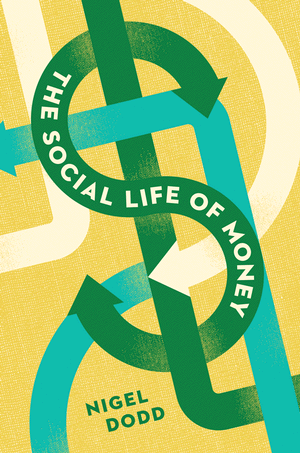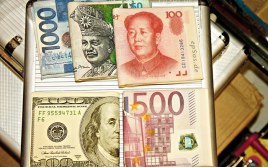Transcript
What exactly is money?
 Nigel Dodd: We usually think of money as notes and coins, or even gold. But, in fact, it mostly takes the form of claims made through the banking system, mediated by plastic cards! Money has a dynamic quality – it is more like a verb than a noun.
Nigel Dodd: We usually think of money as notes and coins, or even gold. But, in fact, it mostly takes the form of claims made through the banking system, mediated by plastic cards! Money has a dynamic quality – it is more like a verb than a noun.
Money is claims that move between people, and it is that movement that sustains its value. It has value not because it has intrinsic qualities, but because of the series of relationships it is part of. For example, you accept euros or pounds or dollars or yen in return for your work, and you then exchange them for goods and services.
In other words, money is what it does rather than what it is.
Craig Barfoot: So is it about trust?
ND: Money is partly about trust. We want to trust that the money in our pocket will retain its value. We don’t want to be worrying about money, indeed as soon as we do it means money is in trouble eg in periods of hyperinflation. As soon as it is under threat, we start thinking about it, which we don’t normally do. If you ask people in Britain, for example, if they want to join the euro, you find out all sorts of things about the assumptions people make and the way they think about their money – it means something to do with values, history, culture etc.
CB: One idea is that money is a claim on society
ND: David Frisby, translator of Georg Simmel’s The Philosophy of Money, reminded me that my book was about money, not banking! And he was right, what we had witnessed in 2008-9 was a financial crisis, and that was not the same as a crisis about money. Money is not the same as finance, it is not reduceable to the banking system.
I saw this banner at the occupy movement rally in Paternoster Square which said, ‘We are the true currency’. And I remember thinking, ‘that is really interesting, what is being suggested here is that there is a representation of money which is much closer to our core humanity, or communality, our sociality.’ It is not the state or wall street or the banks – money is us, it isn’t the banks, we need to reclaim it.
Money is a claim upon society – we have a generalised claim that we can levy on anyone else. We can exchange the money for goods. With any payment community – the European Union, UK, or in Bristol, the Bristol pound.
Money is a claim on social life. Each chapter in my book is an iteration of Georg Simmel’s idea of money as ‘a claim on society’.
CB: You talk about monies – not money, but surely I have just one currency, euros.
ND: Air miles, euros, pounds, store cards, the Brixton pound, Bitcoin, local currencies emerging in Greece – they are all forms of money.
And what is more, the way we pay is changing. Soon we will all be paying with our mobile phones. And that means participating in payments networks that aren’t connected to the banking system, such as ApplePay.
CB: So can anyone start their own currency?
ND: Yes, but that was not always the case. In Austria in 1920s, a town launched a successful currency, and several others started up, but that was stopped by an Austrian law. However, in most countries you can, though you obviously have to go through certain regulatory rules, eg the Bristol pound is backed by pound sterling. What is happening is that smaller and smaller groups are establishing their own money for certain things – that is exciting
CB: Control of money supply is control of power. Why are governments prepared to allow others to start their own currency?
ND: This is about the end of the national monopoly over the production of money, rather than the end of national money. What we see emerging is small, minor currencies which answer a need – eg currencies that work for the unbanked. For example, in Argentina after the default the official currency collapsed and smaller local currencies, based on systems of batter, emerged – as in Greece today. But it isn’t a takeover of national money – eg Bitcoin isn’t going to be the only money in town!
CB: Why do you say it is ‘socially necessary’ to keep the illusion of money as a ‘thing’ ?
ND: I don’t know the answer to that, but I do know that somehow we have to persuade ourselves that money has value, and the way we do that habitually is to think of money as a thing, as carrying value inside itself. Anything else seems to be difficult cognitively. Maybe it is just what we are used to, a habit of thought, that we still imagine money as a noun. It is certainly incredibly common to see it as a variant of gold.
CB: But I’d say that is everybody, everybody does that….
ND: And perhaps that is what I mean by ‘socially necessary’. if we don’t think like that then it flakes, and we start to worry about it. For money to sustain its value, we have to think of it like that.
CB: And if we don’t, the magic is gone?
ND: Yes, but there is no mystery about money – it is a claim that is passed around. But even bitcoin, an abstract idea, uses materialist language – you ‘mine’ for it , it has ‘rigs’ – it is the language we use for precious metals! So it seems we have to give money materialist paraphernalia, that without the underlying fictions we have a problem getting our heads around it.
CB: you say money costs more when you are poor
ND – What I mean by that is, for example, payday loans. With mortagages and loans, the poorer you are the higher the interest rates. The poor are a lucrative market – Western Transfer, if you want to send £10 to your family overseas you have to pay 25%. There is a huge industry making money out of the poor.
CB: There is a knowledge gap.
ND Yes. Here is an example. Technically money is created by the banking system, not by governments, but lots of people think it is the state that creates money on a printing press. A survey of MPs in the UK parliament suggested that even they think it is created by the central bank and sits in the central bank.
CB: Money is political. You argue that transforming money is a way of creating change.
ND: The Gates foundation has looked at this. Money can spread messages, transform behaviour, and people are thinking of how you can redesign money, develop systems to enhance people’s lives. There will always be politics in money, money can’t be a-political. But approaching change through money rather than politics is exciting and inspiring.
CB: You said, money should be an embodiment of our common humanity
ND: That goes back to the poster in Paternoster Square – my moment of ‘revelation’ – that the value of money is down to the people who use it. I like to take things down to the simplest level – money works as long as it works and is used as payment – that is what sustains its value. Money is what all of us value. There is an inherent utopianism in money that hasn’t been tapped, we can think of money as positive and transformative.
Podcast produced and presented by Craig Barfoot
……………………
Follow these links for more podcasts on:
Picture by Epsos.de
Tags: Bitcoin, Money, Occupy Movement, Prof Nigel Dodd, The Social Life of Money


Quote: “The key thing that this book explained was how money was created by banks and whereas people think it goes into businesses and to helping the economy grow, most of this money actually goes into the property market and financial markets.”
There is only one economy and all money has been put into circulation as debt against various asset values. A separation of debt in one or the other sector remains meaningless.
Quote: “Money is a claim upon society – Money is a claim upon society”
Lets call it debt, it isn’t as nice as the word money, but it only claims interest.
You don’t seem to point out the basic flaw of debt, that is the scarcity it causes, since the borrowed amounts are never enough for repaying the debt with fees and interest. That means the borrower must make additional profit, which must be obtained from some other borrower’s debt.
It also needs constant expansion and growth of profits and engenders a whole plethora of ill effects, such as poverty, destructive competitiveness for scarce finance, wars of dominating foreign markets, and exploitation of society and the environment to obtain that scarce profit needed – all to successfully borrow and bring enough asset converted debt into circulation.
Now there you have something radical to change – from debt to credit, utilizing real capital, that is people’s skills and sustainable resources for our goods and services. That’s how Benjamin Franklin ran the early American colonies, thats how Abraham Lincoln tried to run the USA, and that’s how the Mayor, of Woergl Austria ran the Lets currency during 1933-34. While all the other attempts to change this or that, while still being embedded within the debt system didn’t alter anything fundamentally, and the ills of the method the Bank Charter of the Bank of England of 1694 are still with us today.
Here is a podcast available to enlighten the present method of global money:
view: http://www.radio4all.net/index.php/program/76751
download: http://www.radio4all.net/responder.php/download/76751/84807/96958/?url=https://archive.org/download/KR287/KR287.mp3
Feel free to write to me
Martin
I think money is not just a facilitator for barter, but an active medium with powerful properties of its own.